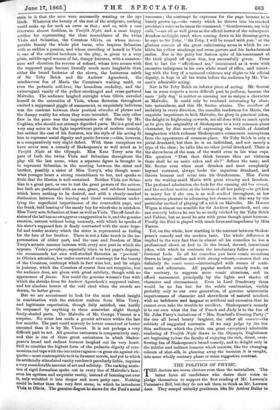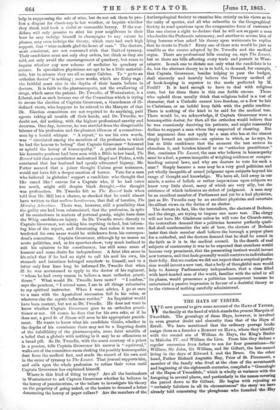TEE POLITICS OF PHYSIC.
THE doctors are worse electors even than the teetotallers. The latter force all candidates who desire their votes to pledge themselves to support the first reading of Mr. Lawson's Permissive Bill, but they do not ask them to think as Mr. Lawson does. They compel unlucky gentlemen like Sir Arthur Buller to help in suppressing the sale of wine, but do not ask them to pro- fess a disgust for claret-cup in hot weather, or inquire 'whether they think iced hock a sinful or reasonable luxury. If the can- didate will only promise to stint his poor neighbours in their beer he may indulge himself in champagne to any extent he pleases, may even indulge the theory, which once had such high support, that " wine maketh glad the heart of man." The doctors, more consistent, are not contented with that limit ed tyranny. Their candidates must not only obey orders, but think as they are told, not only avoid the encouragement of quackery, but cease to inquire whether any new scheme of medicine be quackery or science. In speculation physicians are apt to be a little material- istic, but in science they are all so many Calvins. To " go to an orthodox doctor" is nothing ; mere works, which are filthy rags ; the faithful must also in the depths of their hearts believe in doctors. It is faith in the pharmacopoeia, not the swallowing of drugs, which saves the patient. Dr. Tweedie, of Westminster, is a Liberal, and as such became one of the Committee which is trying to secure the election of Captain Grosvenor, a Guardsman of ill- defined views, who happens to be related to the Marquis of that ilk. Election committees are not required to do anything, paid agents taking all trouble off their hands, and Dr. Tweedie, we doubt not, did nothing, with the highest professional suavity and decorum. One day, however, he was startled from the disagreeable labours of his profession and the pleasant idleness of a committee- man by a horrid whisper. " A report;' to use his own words, was " circulated among the members of the profession to which he had the honour to belong" that Captain Grosvenor " favoured or upheld the heresy of homoeopathy." A priest informed that his favourite penitent had been seen with a Bible in her hand, The Record told that a contributor understood Hegel and Fichte, a wife convinced that her husband had openly advocated bigamy, Mr. Potter assured that a joiner thought -Unions great nuisances, would not have felt a deeper emotion of horror. Vote for a man who believed in globules ! support a candidate who thought that like cured like ! canvas for a Captain who, if he had eaten too much, might still despise black draught,—the thought was profanation. Dr. Tweedie felt as The Record feels when told that Mr. Mill has a chance, so shocked that he could almost have written to that malleus hereticorum, that flail of heretics, The Morning Advertiser. There was, however, still a possibility that the guilty one had been calumniated, that the profession, in spite of its omniscience in matters of personal gossip, might have done the Whig candidate an injury. So Dr. Tweedie wrote directly to Captain Grosvenor, not asking him anything indeed, but inform- ing him of the report, and threatening that unless it were con- tradicted his own name would be withdrawn from his correspon- dent's committee. Captain Grosvenor, although by no means an acute politician, and, as his speeches show, very much inclined to suit his opinions to his constituency, has still some sense of humour and some desire for independence. A faint idea arose in his mind that if he had no right to call his soul his own, his stomach and intestines belonged somehoiv to himself, and in a letter only four lines long he informed Dr. Tweedie that when ill he was accustomed to apply to the doctor of his regiment, "whom he had every reason to believe a most orthodox practi- tioner." What would Dr. Tweedie have more? " I confess," says the penitent, " I attend mass, I am in all things submissive to my spiritual instructor. When I want advice, I go at once to a man with the Apostolical succession full in his veins, or wherever else the mystic influence resides." An Inquisitor would have been content, but not so Dr. Tweedie. He does not want to know whether Captain Grosvenor goes to an orthodox practi- tioner or not. Of course he does that for his own sake, or if he -does not, a good fit of illness will soon be his appropriate punish- ment He wants to know what his candidate thinks, whether in the depths of his conscience there may not be a lingering doubt of the infallibility of the pharmacopceia, some faint scintilla of a belief that a globule with nothing in it may be as efficacious as a bread pill. So Dr. Tweedie, with the scant courtesy of a priest. in a passion, tells Captain Grosvenor his answer is " equivocal,"• walks out of the committee-room shaking the possibly homoeopathic dust from the medical feet, and sends the record of his own zeal in the cause of tyranny to The Lancet. That journal supports him, and calls upon the whole profession to refuse their votes until Captain Grosvenor has explained himself.
Where is this kind of thing to stop? Are all the bootmakers in Westminster to ask Captain Grosvenor whether he believes in the heresy of panniscorium, or the tailors to investigate his theory on the propriety of going naked, or the hosiers to demand a letter denouncing the heresy of paper collars? Are the members of the Anthropological Society to examine him strictly on his views as to the unity of species, and all who subscribe to the Geographical Society to send questions upon the comparative force of currents ? Has one elector a right to declare that he will not support a man who doubts the Ptolemaic astronomy, and another to accuse him of lying because when asked his theory upon waistcoats he replies that he trusts to Poole? Wrery one of those acts would be just as sensible as the course adopted by Dr. Tweedie and the medical organ. There are professional bills coming on, says The Lancet, but so there are bills affecting every trade and pursuit in West- minster. Is each one to dictate not only what the candidate is to do, but the abstract theory he is to hold, to demand, for example, • that Captain Grosvenor, besides helping to pass the budget, shall sincerely and heartily believe the Treasury method of of book-keeping is superior to the mode perfected by M. Fould ? It is hard enough to have to deal with religious tests, but for them there is this one feeble excuse. Those who uphold them usually think that religious belief is a test of character, that a Catholic cannot love freedom, or a Jew be fair to Christians, or an infidel keep faith with the public creditor. There is nothing of the kind to be said for the medical test. There would be, we acknowledge, if Captain Grosvenor were a homoeopathic doctor, for then all the orthodox would believe that he was consciously deceiving his patients, and might reasonably decline to support a man whom they suspected of cheating. But that argument does not apply to a man who has at the utmost simply formed an opinion—an opinion in which, as he says, he has so little confidence that the moment the test arrives he abandons it, and betakes himself to an "orthodox practitioner." But, continues The Lancet, the man who believes in homoeopathy must be a•fool, a person incapable of weighing evidence or compre- hending natural laws, and why are doctors to vote for such a man ? Simply because a man may be a very good politician and yet wholly incapable of sound judgment upon subjects beyond his range of thought and knowledge. We have all, laid away in our minds, a series of beliefs or rather impressions upon subjects we know very little about, many of which are very silly, but the existence of which indicates no defect of judgment. A man may be an excellent member of Parliament and yet be a 'bad physician, just as Dr. Tweedie may be an excellent physician and entertain the silliest views on the duties of an elector.
The doctors in fact, like the teetotallers, the electors of Bodmin, and the clergy, are trying to impose one more test. . The, clergy will not have Mr. Gladstone unless he will vote for Church-rates, the teetotallers demand that a politician however perfectly quali- fied shall anathematize the sale of beer, the electors of Bodmin insist that their member shall believe the borough a proper place for a cathedral, and the doctors demand that he shall be sound in the faith as it is in the medical council. In the dearth of real subjects of controversy it was to be expected that crotchets would become very prominent, that the persecuting instinct would invent new tortures, and that fools generally would contrive to individualize their folly. But we confess we did not expect that a sceptical profes- sion would invent a new test, that a body of thoughtful men would help to destroy Parliamentary independence, that a class filled with hard-headed men of the world, familiar with the mind in all its phases, would pronounce a politician incompetent because he entertained a passive impression in favour of a doubtful theory as to the virtues of nothing carefully administered.































 Previous page
Previous page